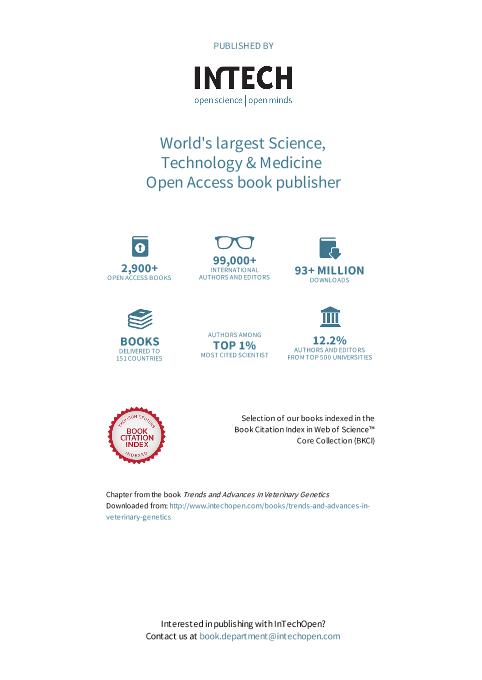Mostrar el registro sencillo del ítem
dc.contributor.author
Gutiérrez, Silvina Elena

dc.contributor.author
Esteban, Eduardo Néstor

dc.contributor.author
Lützelschwab, Claudia María

dc.contributor.author
Juliarena, Marcela Alicia

dc.contributor.other
Abubakar, Muhammad
dc.date.available
2021-07-01T15:55:27Z
dc.date.issued
2017
dc.identifier.citation
Gutiérrez, Silvina Elena; Esteban, Eduardo Néstor; Lützelschwab, Claudia María; Juliarena, Marcela Alicia; Major histocompatibility complex-associated resistance to infectious diseases: the case of bovine leukemia virus infection; IntechOpen; 2017; 101-126
dc.identifier.isbn
978-953-51-3042-0
dc.identifier.uri
http://hdl.handle.net/11336/135282
dc.description.abstract
The major histocompatibility complex (MHC) is a polymorphic gene cluster of about 150 genes, present in all vertebrates. Many of these genes contribute to immunity. Particularly, MHC‐encoded class I and class II molecules, which are typically highly polymorphic and polygenic, are central in defining the specificity of the adaptive immune response. Among the diversity of genes associated with disease resistance, MHC genes are particularly interesting as they are associated with resistance and susceptibility to a wide range of diseases, some of which produce important economic losses in livestock. Enzootic bovine leukosis is an infectious disease caused by the retrovirus bovine leukemia virus (BLV), with an important economic impact, mainly in dairy herds. In this chapter, MHC‐associated genetic resistance to BLV is revised. Certain alleles of the bovine MHC (BoLA) class II locus have been found strongly associated with resistance to viral dissemination. Genetic selection of resistant animals emerges as a natural strategy for the control of infectious diseases, especially when there is no other alternative of control or prevention, as vaccines. Founded on this knowledge, a BLV control program based on selection of genetically resistant cattle was designed. The proof of concept indicates that this strategy is feasible to implement in dairy herds.
dc.format
application/pdf
dc.language.iso
eng
dc.publisher
IntechOpen

dc.rights
info:eu-repo/semantics/openAccess
dc.rights.uri
https://creativecommons.org/licenses/by-nc-sa/2.5/ar/
dc.subject
MAJOR HISTOCOMPATIBILITY COMPLEX
dc.subject
BOLA
dc.subject
GENETIC RESISTANCE
dc.subject
INFECTIOUS DISEASES
dc.subject
BOVINE LEUKEMIA VIRUS
dc.subject
CONTROL
dc.subject
VETERINARY
dc.subject
LIVESTOCK
dc.subject.classification
Otras Ciencias Veterinarias

dc.subject.classification
Ciencias Veterinarias

dc.subject.classification
CIENCIAS AGRÍCOLAS

dc.title
Major histocompatibility complex-associated resistance to infectious diseases: the case of bovine leukemia virus infection
dc.type
info:eu-repo/semantics/publishedVersion
dc.type
info:eu-repo/semantics/bookPart
dc.type
info:ar-repo/semantics/parte de libro
dc.date.updated
2021-06-07T16:55:50Z
dc.journal.pagination
101-126
dc.journal.pais
Croacia

dc.journal.ciudad
Rijeka
dc.description.fil
Fil: Gutiérrez, Silvina Elena. Consejo Nacional de Investigaciones Científicas y Técnicas. Centro Científico Tecnológico Conicet - Tandil. Centro de Investigación Veterinaria de Tandil. Universidad Nacional del Centro de la Provincia de Buenos Aires. Centro de Investigación Veterinaria de Tandil. Provincia de Buenos Aires. Gobernación. Comision de Investigaciones Científicas. Centro de Investigación Veterinaria de Tandil; Argentina
dc.description.fil
Fil: Esteban, Eduardo Néstor. Consejo Nacional de Investigaciones Científicas y Técnicas. Centro Científico Tecnológico Conicet - Tandil. Centro de Investigación Veterinaria de Tandil. Universidad Nacional del Centro de la Provincia de Buenos Aires. Centro de Investigación Veterinaria de Tandil. Provincia de Buenos Aires. Gobernación. Comision de Investigaciones Científicas. Centro de Investigación Veterinaria de Tandil; Argentina
dc.description.fil
Fil: Lützelschwab, Claudia María. Consejo Nacional de Investigaciones Científicas y Técnicas. Centro Científico Tecnológico Conicet - Tandil. Centro de Investigación Veterinaria de Tandil. Universidad Nacional del Centro de la Provincia de Buenos Aires. Centro de Investigación Veterinaria de Tandil. Provincia de Buenos Aires. Gobernación. Comision de Investigaciones Científicas. Centro de Investigación Veterinaria de Tandil; Argentina
dc.description.fil
Fil: Juliarena, Marcela Alicia. Consejo Nacional de Investigaciones Científicas y Técnicas. Centro Científico Tecnológico Conicet - Tandil. Centro de Investigación Veterinaria de Tandil. Universidad Nacional del Centro de la Provincia de Buenos Aires. Centro de Investigación Veterinaria de Tandil. Provincia de Buenos Aires. Gobernación. Comision de Investigaciones Científicas. Centro de Investigación Veterinaria de Tandil; Argentina
dc.relation.alternativeid
info:eu-repo/semantics/altIdentifier/doi/http://dx.doi.org/10.5772/65804
dc.relation.alternativeid
info:eu-repo/semantics/altIdentifier/url/https://www.intechopen.com/chapters/52715
dc.conicet.paginas
160
dc.source.titulo
Trends and Advances in Veterinary Genetics
Archivos asociados
